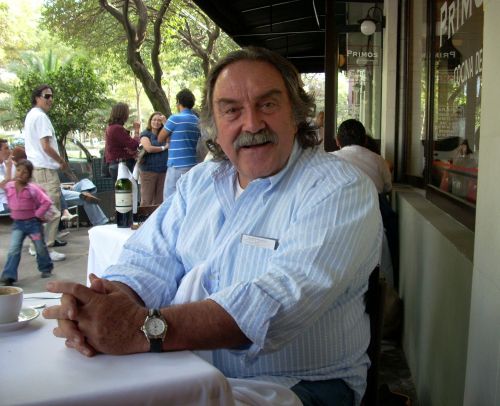Like his father before him, Pedro Armendariz Jr. is a beloved movie actor. Since his debut in 1966 in Fuera de la ley (Outside the Law), he has appeared in about 200 flicks, playing private eyes and police detectives, soldiers and priests, sea captains and state governors and even Pancho Villa himself. He has acted in U.S.-financed extravaganzas filmed in Mexico such as The Legend of Zorro, Once Upon a Time in America and License to Kill. Yet in recent years, he has converted to Judaism – at least on the Mexico City stage, where he appeared in back-to-back long runs as Tevye the dairyman in Fiddler on the Roof, and Max Bialystock in The Producers. Here he is on a recent afternoon, savoring a coffee after a non-kosher lunch at the restaurant Primos in the Colonia Condesa.
Jews
Lagunazis
Photo by Ibarí Ortega
Manuel won’t say yes, and he won’t say no. Maybe Hitler killed six million Jews in the Holocaust, as well as six million others. And maybe he didn’t. “It’s very arguable,” he says. “I wasn’t born yet in those days. I’m not the type of person who looks at a photo of an individual that I don’t even know, and says he’s this big criminal. I’m not the kind of person who lets others manipulate him. I’m nobody’s sheep.”
After I identify myself as a Jew, who had grandparents, uncles and various relatives who died in the gas chambers of concentration camps, Manolo becomes pensative. “Probably it happened, and it’s a tragedy. But you know what? It’s not my problem.” For over ten years he has sold Nazi paraphernalia in La Lagunilla, Mexico City’s most important flea market. Among his problems, Manolo mentions the Jews who occasionally pass by his stand and insult him. Manolo’s only ideology is commerce, and he even sees these people’s ire as a potential business opportunity. “I tell them, if you want to burn that Nazi flag, go ahead. It costs 2000 pesos. Give me the money and you can burn it right here.”
He says a lot of his clients are looking for “spiritual reinforcement,” and some of them find it once they’ve put on a T shirt with a swastika emblem. They are yet another prospect. “They come back and they say, ‘That T shirt has something, I put it on and I want to go to work, to do exercise,’” he says. “And I tell them, ‘Look, I’ve got other models.’” A badge that Manolo says is from the Nazi era costs between 1500 and 2500 pesos and an Iron Cross– the medal won by Nazis wounded in battle – in its original box costs 15,000. Manolo also makes copies, which are cheaper.
Conversation with him is more coherent than that of the five young men who work the stand a few yards away. Under a Nazi flag they sell the most notorious anti-Semitic literature translated in Spanish. The day I arrived they told me they had sold out their copies of The Protocols of the Elders of Zion and Mein Kampf, but suggested that if I came early the following week, there would be more. They insist the Holocaust never happened. “It’s a lie, a trick, a fraud,” says one, who appropriately identifies himself as Adolfo.
They believe in their cause so strongly that it doesn’t faze them that the majority of the world thinks that what they have read in Holocaust-denial literature is absurd. They say the diary of Anne Frank is fraudulent because it was written with a kind of pen that didn’t exist until after the war. That Churchill, Roosevelt and Stalin were all Jews. That today, Coca-Cola and Pepsi are supporters of Zionism and that the Jews manage international drug traffic from the fourth floor of the New York Stock Exchange. And why doesn’t everyone know all this? Obvious: the Jews control all the media in the universe.
When I mention that nearly all of my mother’s family died in the camps, they look at me like a misinformed unfortunate. Adolfo assures me that some of them may have died fighting against Hitler, while others may still be around in some part of Poland.

